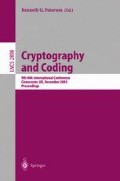Abstract
We discuss how to implement a secure card game without the need for a trusted dealer, a problem often denoted “Mental Poker” in the literature. Our solution requires a broadcast channel between all players and the number of bits needed to represent each card is independent of the number of players. Traditional solutions to “Mental Poker” require a linear relation between the number of players and the number of bits required to represent each card.
Access this chapter
Tax calculation will be finalised at checkout
Purchases are for personal use only
Preview
Unable to display preview. Download preview PDF.
References
Banary, I., Furedi, Z.: Mental poker with three or more players. Information and Control 59, 84–93 (1983)
Boneh, D., Franklin, M.: Efficient generation of shared RSA keys. In: Kaliski Jr., B.S. (ed.) CRYPTO 1997. LNCS, vol. 1294, pp. 425–439. Springer, Heidelberg (1997)
Boneh, D., Franklin, M.: Efficient generation of shared RSA keys. J. ACM 48, 702–722 (2001)
Chaum, D., Pedersen, T.P.: Wallet databases with observers. In: Brickell, E.F. (ed.) CRYPTO 1992. LNCS, vol. 740, pp. 89–105. Springer, Heidelberg (1993)
Cramer, R., Damgåard, I., Schoenmakers, B.: Proofs of partial knowledge. In: Desmedt, Y.G. (ed.) CRYPTO 1994. LNCS, vol. 839, pp. 174–187. Springer, Heidelberg (1994)
Crépeau, C.: A secure poker protocol that minimises the effect of player coalitions. In: Williams, H.C. (ed.) CRYPTO 1985. LNCS, vol. 218, pp. 73–86. Springer, Heidelberg (1986)
Crépeau, C.: A zero-knowledge poker protocol that achieves confidentiality of the player’s strategy, or how to achieve an electronic poker face. In: Odlyzko, A.M. (ed.) CRYPTO 1986. LNCS, vol. 263, pp. 239–247. Springer, Heidelberg (1987)
Damgåard, I., Jurik, M.: A generalisation, a simplification and some applications of Paillier’s probabilistic public-key system. In: Kim, K.-c. (ed.) PKC 2001. LNCS, vol. 1992, pp. 119–136. Springer, Heidelberg (2001)
Fortune, S., Merrit, M.: Poker protocols. In: Blakely, G.R., Chaum, D. (eds.) CRYPTO 1984. LNCS, vol. 196, pp. 454–464. Springer, Heidelberg (1985)
Goldwasser, S., Micali, S.: Probabilistic encryption and how to play mental poker keeping secret all partial information. In: STOC 1982, pp. 365–377 (1982)
Goldwasser, S., Micali, S.: Probabilistic encryption. Journal of Computer and Systems Sciences 28, 270–299 (1984)
Goldreich, O., Micali, S., Widgerson, A.: How to play any mental game or a completeness theorem for protocols with honest majority. In: STOC 1987, pp. 218–229 (1987)
Paillier, P.: Public key cryptosystems based on composite residue classes. In: Stern, J. (ed.) EUROCRYPT 1999. LNCS, vol. 1592, pp. 223–238. Springer, Heidelberg (1999)
Pointcheval, D., Stern, J.: Security arguments for digital signatures and blind signatures. Journal of Cryptology 13, 361–396 (2000)
Shamir, A., Rivest, R., Adleman, L.: Mental Poker. MIT Technical Report (1978)
Schindelhauer, C.: A toolbox for mental card games. Technical Report, Uni Lubeck (1998)
Yung, M.: Subscription to a public key, the secret blocking and the multi-party poker game. In: Blakely, G.R., Chaum, D. (eds.) CRYPTO 1984. LNCS, vol. 196, pp. 439–453. Springer, Heidelberg (1985)
Author information
Authors and Affiliations
Editor information
Editors and Affiliations
Rights and permissions
Copyright information
© 2003 Springer-Verlag Berlin Heidelberg
About this paper
Cite this paper
Barnett, A., Smart, N.P. (2003). Mental Poker Revisited. In: Paterson, K.G. (eds) Cryptography and Coding. Cryptography and Coding 2003. Lecture Notes in Computer Science, vol 2898. Springer, Berlin, Heidelberg. https://doi.org/10.1007/978-3-540-40974-8_29
Download citation
DOI: https://doi.org/10.1007/978-3-540-40974-8_29
Publisher Name: Springer, Berlin, Heidelberg
Print ISBN: 978-3-540-20663-7
Online ISBN: 978-3-540-40974-8
eBook Packages: Springer Book Archive

